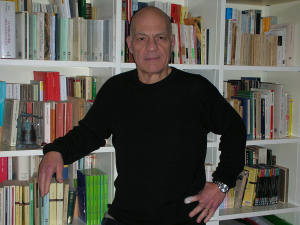 Two weeks ago I started a class of bridge at Ascoli Piceno’s Circolo Cittadino (City Club); my three pupils, Cinzia, Giampaolo and Valentina didn’t know anything of the game, it was their very first time at the table. I dealt a deck, turning up the last card, and I started to explain the Whist. I pointed out that it needed to carefully watch and remember any card. Later, at home, I received an email from Giampaolo; he wrote about card memorizing and asked me:
Two weeks ago I started a class of bridge at Ascoli Piceno’s Circolo Cittadino (City Club); my three pupils, Cinzia, Giampaolo and Valentina didn’t know anything of the game, it was their very first time at the table. I dealt a deck, turning up the last card, and I started to explain the Whist. I pointed out that it needed to carefully watch and remember any card. Later, at home, I received an email from Giampaolo; he wrote about card memorizing and asked me:
…Are there techniques to develop some specific memory?… Could be possible to make a choice of what might be more useful to memorize?
In my opinion, Giampaolo’s asking dealt with a main key of bridge thinking, and it deserved many responses, not one only; therefore I forwarded it to others. Today the responses from Doris Fischer and Margit Schwarz.
 Doris and Margit: Teaching Bridge – Margit is teachings kids. Doris is teaching the juniors who want to play in the national team and advanced tournament players.
Doris and Margit: Teaching Bridge – Margit is teachings kids. Doris is teaching the juniors who want to play in the national team and advanced tournament players.
In our opinion it is very important to know which memory type a person is. Somebody remembers best when he is reading something, somebody when he talks repeating a subject, somebody when he is writing down the things he likes to remember. And for everybody it`s important to train the new items in practise.
So we use all these techniques when we teach our young students. We force the juniors to fill in an international convention card as soon as possible and to write down different parts of their system. We use oral repetition and written repetition in quiz formula. We also make them go from one place to another where they find different kinds of exercises. They remember better this way than sitting the whole time on the same place.
At the beginning of each new lesson we make them repeat the old stuff in different kind of ways. For instance they receive from us north and south hands to a special theme and they bid these hands. They love this bidding challenge, because they get points afterwards for the contract they reached. They appreciate some concurrence between themselves. To hear our positive feedback „You remembered very well!“ on front of the others is very important for them.
 Doris: Techniques to train the own memory – There will not be much difference to the methods other good or better players are using.
Doris: Techniques to train the own memory – There will not be much difference to the methods other good or better players are using.
I am sometimes a little bit lazy or not concentrated enough to focus on opponent`s small cards when I am declarer. So if the declarer play is not easy or one way I repeat the first trick in my mind. After four tricks I do the same, so I find it easier not to miss a six or five which might be important at trick seven.
When I am on lead and dummy comes down I always count immediately the points of dummy and the ones declarer will probably have. So I know at the first trick approximately partner’s points. And I don’t have to figure it out during the game. It’s a very helpful automatism.
My bridge partner and I always work on our system deleting sequences we used to play and introducing new conventions. I remember everything best when I write it down. It helps me more than reading several times.
There are some sequences in my system which I always remember although they are difficult and don’t occur often. But unfortunately there are some – even not so difficult ones – which always cause me problems. On some reason or the other they do not seem logical for me. I have to repeat them in my mind before an important tournament. And I use some weird “bridges” like: In a special situation I play ascending control showing with a maximum. So I remember the „a“ of „maximum“ and the „a“ of „ascending“.
***
Memorizing at Bridge – by Paolo Enrico Garrisi
- Part 5: Giorgio Duboin and Mark Horton »
- Part 4: “Exercises”»
- Part 3: “Shortcuts”»
- Part 2: “An obsessive counter” »
- Part 1: “A trick tells a story”»